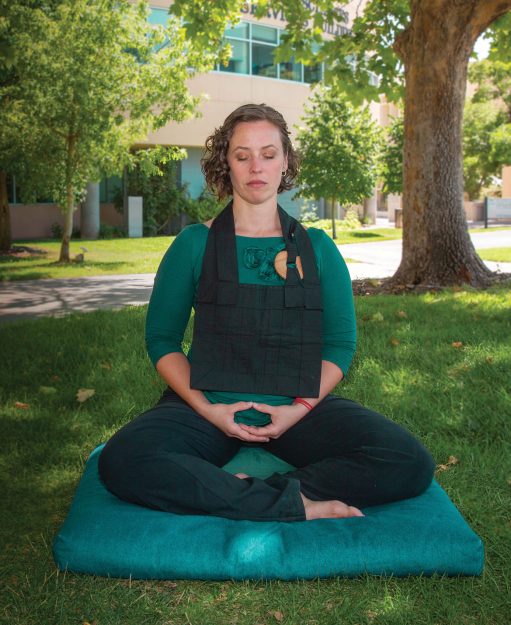Rebecca Williams-Karnesky credits her practice at Portland’s Dharma Rain Zen Center with helping her survive a demanding MD/PhD program at Oregon Health & Science University. Later, stressed-out colleagues in the University of New Mexico’s surgical residency program remarked on her calm, steady demeanor despite all-night shifts and 80-hour workweeks. They asked her what her secret was, which got her thinking about how she could teach mindfulness to others. Williams-Karnesky won support from administrators in part because they thought mindfulness might help with physician burnout. She now teaches a mindfulness course for third-year medical students, who learn breathing practices and metta (lovingkindness) meditation.
***
How did daily practice at a Zen center affect your experience in medical school? It helped me clarify my reasons for going into medicine. When I started, there was a larger component of ego driving me. Much of it felt like expectation or desire to please others. Practicing with a teacher and having her reflect those things back to me allowed me to understand those drivers and set them down. In zazen you see the transitory nature of things, and if you sit with something long enough it will go away. That helps when you’re in the midst of a difficult situation with a patient.
Third-year med students typically rotate through clinical settings, but for now they’re learning in a virtual environment. How have you adapted to teaching mindfulness during the COVID-19 pandemic? Students usually experience stress when they enter a clinical setting for the first time, but the biggest challenge they’re facing right now is just the uncertainty and anxiety about what’s going on. The mindfulness classes can serve as an immediate stress-relief tool. I’ve actually restructured the course a little bit and increased the amount of interactivity, asking students to spend more time actually practicing these techniques. While I’m teaching them the same tools I did before, the sources of their anxiety are looking really different right now. Luckily, I have a student who is really interested in mindfulness who is helping me with the course. She has the perspective of being a current med student who can check in with classmates and is acutely aware of the present challenges.
What benefits does mindfulness hold for medical students and other health care providers? One is the ability to be present with patients, with colleagues, with yourself, and to recognize suffering in yourself or others. Cultivating that ability to be still in the midst of something that’s very chaotic—I think that’s huge. In the trauma bay, if you can be there with a patient and calmly tell them what’s going to happen next, they’ll respond to that even if they are acutely injured.

How do you present this to students? I tell them: if we approach the practice of medicine mindfully, we can redesign the system in a way that will help prevent burnout. But more than that, the focus on cultivating compassion and joy of practice are for your personal relationships and well-being. That doesn’t get talked about in medical school, but it has practical application to your life, to your career—it’s a skill that you can learn and improve upon. I also provide them with examples, like answering a pager. When your pager goes off it creates a Pavlovian response: you’re tense, angry, afraid. Mindfulness allows you to create some space, and then you can pick up the phone, do some cognitive reframing, take a deep breath and say, “Hey, how can I help you?”
What sort of response have you received? Over the past couple of years, 96 percent of students think the course should continue to be offered, 94 percent think it should be mandatory, and 74 percent say they’ve used a mindfulness activity outside of class. There’s usually one person who asks, “Why are we doing this?” And there are always a few people who say, “I’ve been wanting this—this fills a need.” Sometimes a student will look inattentive or skeptical, but afterward they’ll come up and say, “Hey, can we chat a little bit more about this? I’m interested in how I can incorporate this in my life.”